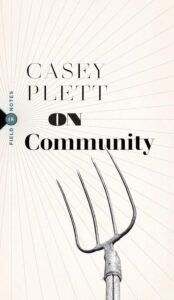November 16, 2023
On Community
A thing I think about sometimes is how, about 15 years ago, there used to be these gatherings of people associated with publishing or who were publishing-adjacent—most of which I did not attend, though when I did, I usually felt like a numpty—after which there would be ecstatic posts on Twitter saying things like, “If they’d dropped a bomb on The Ferret and the Firkin tonight, there’d be no one left in Canadian books!” How, at the time, I even thought this was true, and there was something reassuring in that, in the world and its subsections being so knowable, contained (and the solipsism to boot!).
And I’m not sure exactly what has changed since then—if the world actually has become more complicated, fragmented, if social media is the culprit, or if social media has only made it clear that life was never so tidy, that no single community could ever be so defined or fit in a pub (in Toronto, no less!). Or maybe it’s just that I’ve gotten older and have seen for myself that community and belonging and understanding is a bigger, weirder, harder project that I ever knew, and sometimes the amorphousness of it all, of everything, causes me incredible anxiety.
And that amorphousness—of community, of the idea of community, of the way we talk about “the [FILL IN THE BLANK] community—is the subject Casey Plett takes on in her book On Community, part of the Field Notes series of long essays inspired by big ideas. A book that, like all my favourite nonfiction, not just managed to articulate my preoccupations—my anxiety around community’s amorphousness; how the idea of community can paint over complexity; how perpetually difficult community is, even with its rewards; ideas of belonging and who doesn’t belong; policing borders and what you lose when you don’t, and what you lose when you do; and so much more—but to connect the dots between them in a way I didn’t see coming.
Plett brings a fascinating personal perspective to her essay as a trans woman (ie a member of “the trans community;” “the LGBTQ community;” [by the way, I think the first time I ever heard the absurdity of all this considered was—somewhere?—a laughable reference to “the fat community”]) and as a Mennonite who grew up connected to the communities in Manitoba from which her parents had come. Both are groups in which the idea of community is central, though it manifests in ways both good and bad (and similarly too—ideas of belonging or not, of excommunication, of who does the work and who reaps the rewards, of who gets called out, and whose transgressions remain unremarked upon).
From New York City to Windsor, Ontario; from Plett’s family’s stories and the books of Miriam Toews to her adventures couch-surfing across North American to promote queer small press titles; to whether the internet enhances connection or breaks it (she references characters in Toni Morrison’s Sula hating on the telephone because it meant nobody ever dropped by the house anymore); and the fact that any one community can be embody many different things at once; Plett’s essay is a thoughtful, rich and engaging unpacking of the complexity behind simplistic ideas, and a clear-eyed consideration of what really is a universal human experience.






